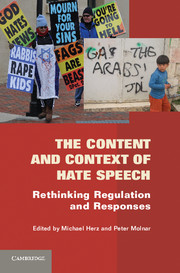Book contents
- Frontmatter
- Contents
- Contributors
- Foreword: Hate Speech and the Coming Death of the International Standard before It Was Born (Complaints of a Watchdog)
- Foreword: Hate Speech and Common Sense
- Acknowledgments
- Introduction
- Part I Overviews
- Part II Refinements and Distinctions
- 7 Social Epistemology, Holocaust Denial, and the Post-Millian Calculus
- 8 Denying Experience
- 9 What's Wrong with Defamation of Religion?
- 10 Responding to “Hate Speech” with Art, Education, and the Imminent Danger Test
- 11 Reconceptualizing Counterspeech in Hate Speech Policy (with a Focus on Australia)
- 12 Hate Speech and Self-Restraint
- 13 Hate Speech in Constitutional Jurisprudence
- 14 One Step Beyond Hate Speech
- 15 Hate Speech and Comprehensive Forms of Life
- Part III Equality and Fear
- Part IV International Law
- Index
- References
8 - Denying Experience
Holocaust Denial and the Free-Speech Theory of the State
Published online by Cambridge University Press: 05 June 2012
- Frontmatter
- Contents
- Contributors
- Foreword: Hate Speech and the Coming Death of the International Standard before It Was Born (Complaints of a Watchdog)
- Foreword: Hate Speech and Common Sense
- Acknowledgments
- Introduction
- Part I Overviews
- Part II Refinements and Distinctions
- 7 Social Epistemology, Holocaust Denial, and the Post-Millian Calculus
- 8 Denying Experience
- 9 What's Wrong with Defamation of Religion?
- 10 Responding to “Hate Speech” with Art, Education, and the Imminent Danger Test
- 11 Reconceptualizing Counterspeech in Hate Speech Policy (with a Focus on Australia)
- 12 Hate Speech and Self-Restraint
- 13 Hate Speech in Constitutional Jurisprudence
- 14 One Step Beyond Hate Speech
- 15 Hate Speech and Comprehensive Forms of Life
- Part III Equality and Fear
- Part IV International Law
- Index
- References
Summary
American constitutional law is exceptionally protective of racist speech. Racist speech is criminally punishable in many western democracies, even though these countries’ laws also protect the freedom of expression. Furthermore, many European countries punish Holocaust denial, based on the understanding that it is a form of racist, anti-Semitic propaganda. In the United States, however, racist speech is protected by the First Amendment's free-speech guarantee. To the American legal mind, the punishment of Holocaust denial would not even constitute a hard case: such a prohibition would be a paradigmatic violation of the First Amendment's free-speech guarantee.
A close engagement with the foreign practice of prohibiting Holocaust denial can shed light on the normative and descriptive propositions underlying our protection of racist speech. In contrasting American racist-speech doctrine with the French experience of prohibiting and punishing Holocaust denial, this chapter compares the two legal cultures’ different understandings of the processes by which a democratic state legitimates its authority to govern a society in which racial minorities are now equal citizens. These divergent accounts of democratic legitimacy have implications for the manner in which the legal system pursues racial equality.
Information
- Type
- Chapter
- Information
- The Content and Context of Hate SpeechRethinking Regulation and Responses, pp. 144 - 163Publisher: Cambridge University PressPrint publication year: 2012
References
Accessibility standard: Unknown
Why this information is here
This section outlines the accessibility features of this content - including support for screen readers, full keyboard navigation and high-contrast display options. This may not be relevant for you.Accessibility Information
- 5
- Cited by
